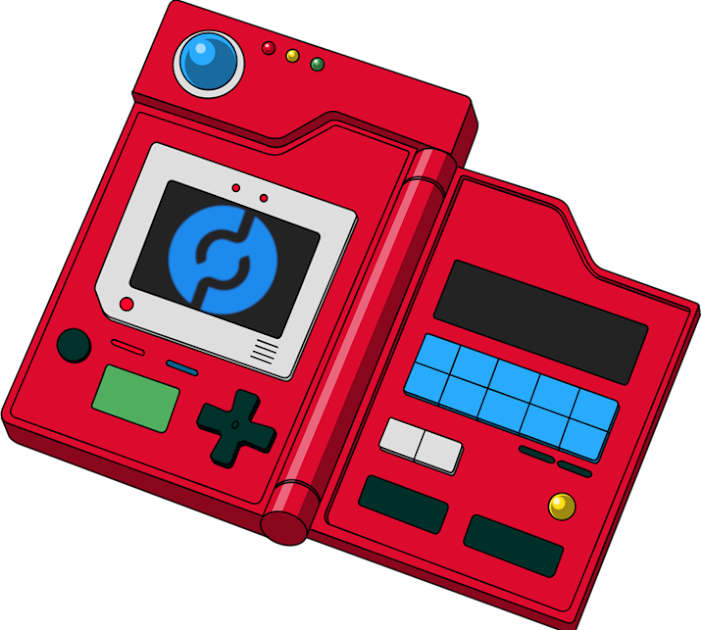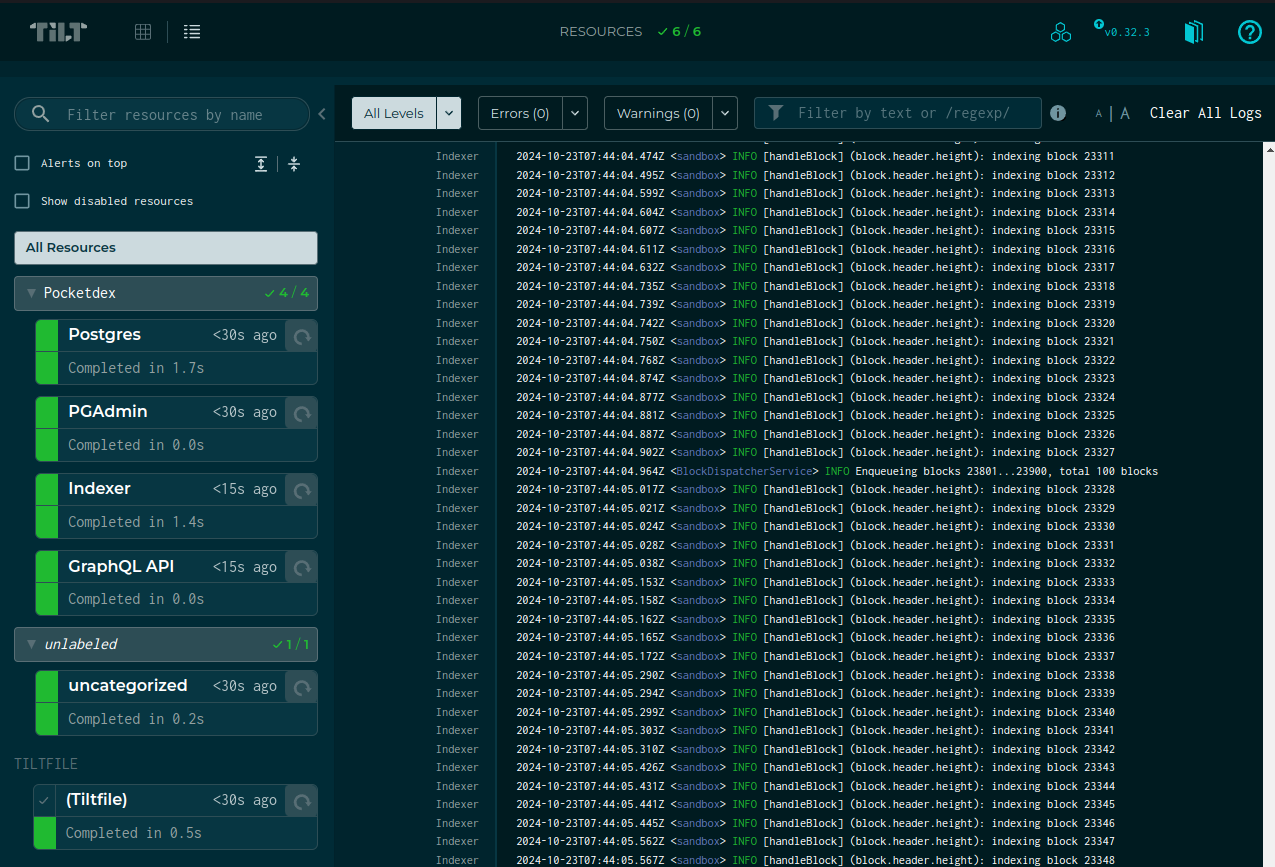Pocketdex is an indexer for the Shannon implementation of the pocket network protocol.
It is built using the SubQuery SDK, which wraps postgraphile to provide a robust GraphQL API to the indexed data.
To learn more about SubQuery, see their docs.
See the introduction docs directory for details on how to use indexed data after you're fully set up.
Connect to the postgres container, update the schema, and explore!
docker exec -it pocketdex_development-postgres-1 psql -U postgres -d postgres
SET SCHEMA "testnet";
# OR, if indexing localnet:
# SET SCHEMA "localnet";
SET search_path TO app;
\dtThe poktscan team put together a playground to explore the testnet data.
You can access at shannon-testnet.poktscan.com and use the sample query below to get started.
Click to expand sample query
query {
distinct_poktroll_event_types: events (distinct: TYPE, filter: {type: {includes: "poktroll"}}){
totalCount
nodes {
type
}
}
distinct_poktroll_message_types: messages (distinct: TYPE_URL, filter:{typeUrl: {includes: "poktroll"}}) {
totalCount
nodes {
typeUrl
# transactionId
}
}
unprocessedEntities (distinct: ERROR) {
totalCount
nodes {
eventId
messageId
transactionId
error
}
}
indexer_metadata: _metadata {
targetHeight
lastProcessedHeight
}
# tx_events: events(filter: {type: {equalTo: "tx"}}) {
# nodes {
# attributes {
# nodes {
# key
# value
# }
# }
# }
# }
# begin_block_events: events (filter: {attributes: {some: {key: {equalTo: "mode"}, value: {equalTo: "BeginBlock"}}}}) {
# nodes {
# attributes {
# nodes {
# key
# value
# }
# }
# }
# }
# events (distinct: TYPE) {
# nodes {
# type
# }
# }
# claims: messages(filter: {typeUrl: {equalTo: "/poktroll.proof.MsgCreateClaim"}}) {
# nodes {
# typeUrl
# json
# }
# }
# eventAttributes(distinct: KEY) {
# nodes {
# key
# }
# }
}Run the following:
yarn install
yarn run codegen
docker context use default # Optional
yarn run docker:build:development
yarn poktroll:proxy:start
yarn run docker:start:developmentyarn installTypes will need to be regenerated any time the graphql.schema is changed.
yarn run codegen3a. Run via Tilt
# Start tilt
tilt up
# Delete tilt resources
tilt downNOTE: 🚨 The poktroll localnet includes pocketdex in its tilt environment. 🚨
If you need to run pocketdex against poktroll localnet, but can't use the poktroll repo's tilt environment for whatever reason, update (but don't commit) the indexer_values_path in the Tiltfile:
load("./tiltfiles/pocketdex.tilt", "pocketdex")
pocketdex("./",
genesis_file_name="testnet.json",
postgres_values_path="./tiltfiles/k8s/postgres/postgres-values.yaml",
pgadmin_values_path="./tiltfiles/k8s/pgadmin/pgadmin-values.yaml",
- indexer_values_path="./tiltfiles/k8s/indexer/dev-testnet-indexer-values.yaml",
+ indexer_values_path="./tiltfiles/k8s/indexer/dev-localnet-indexer-values.yaml",
gql_engine_values_path="./tiltfiles/k8s/gql-engine/dev-gql-engine-values.yaml")Tilt will automatically apply the change on save.
Dotenv files will be automatically created after the yarn install thanks to the postinstall script.
After that, feel free to modify them as you wish.
You will see three dotenv files, each for the corresponding script and environment:
.env.production.env.development.env.test
Alternatively, you can manually create them running:
yarn run env:prepareFor this README we will be running all the commands in development but you can also run them in test or production.
Following this structure, you can run every docker command docker:<cmd>:<production|development|test>,
# Run this ONLY IF indexing poktroll localnet.
# This will allows subquery-node to connect with the poktroll validator
# Leave this open in a separated terminal. Interrupting the terminal will stop the container.
yarn poktroll:proxy:start
# To stop and remove the proxy
yarn poktroll:proxy:stopBuild & start:
# Then build docker and start
yarn run docker:build:development
# This will turn on the process under a WATCHER so any change to the project.ts schema.graphql or src will trigger
# the needed builds again.
yarn run docker:start:developmentStop (without deleted data)
yarn run docker:stop:developmentOr Stop & clean up (delete postgres data):
yarn run docker:clean:developmentIf you're hitting errors with the above command, do a nuclear clean of all potential issues:
yarn cache clean
docker builder prune --all
docker context use defaultNow pick up from the yarn run docker:build step above.
If you are unable to build locally, a pre-built image is available on Docker Hub: bryanchriswhite/pocketdex-subquery-node:latest.
To use this image, pull it down:
docker pull bryanchriswhite/pocketdex-subquery-node:latestThen, re-tag the image to match what docker compose is expecting (assumes the repo root dir is pocketdex):
docker tag bryanchriswhite/pocketdex-subquery-node:latest pocketdex-subquery-node:latestAlternatively, you may update the docker-compose.<env>.yml file, just remember not to commit this change:
services:
subquery-node:
image: bryanchriswhite/pocketdex-subquery-node:latest
...preinstall- Enforces the use of Yarn as the package manager.postinstall- Executes theenv:preparescript after the installation process.env:prepare- Runs theprepare-dotenv.shscript. It prepares .env files fordevelopment,testandproductionenvironments using.env.sample.codegen- Executes the SubQL Codegen.build- Triggers a custom build script written in shell due to its complexity.watch:build- Acts similar to the build script, but it also disables the linter for real-time coding with nodemon.lint- Executes the source code linter.lint:fix- Executes the linter with automatic fixing of solvable issues.format- Applies Prettier to the code according to the rules defined in.prettierrc.format:ci- Checks the code formatting with Prettier without modifying it.vendor:setup- Runs thevendor.shshell script to prepare, run, and build vendor packages.vendor:clean-cache- Removes the.yarn/cachefiles from vendor packages that can potentially lead to errors.vendor:install- Executes thevendor.shshell script to install dependencies for each vendor package.vendor:build- Executes thevendor.shscript to build each vendor package.vendor:lint- Executes thevendor.shscript to lint each vendor package.vendor:clean- Executes thevendor.shscript to recursively removenode_modulesfor each vendor package.docker:compose- Runs thedocker-compose.shscript, which forms the base for all otherdocker:<action>:<environment>scripts.poktroll:proxy:startandpoktroll:proxy:stop- Executesproxy-tunnel.shstarting and stopping the proxy tunnel to poktroll localnet validator, respectively.docker:check-env:<environment>- Ensures the required.env.<environment>exists by runningdotenv-check.sh.docker:build:<environment>- Builds docker images for the specified environment.docker:build:no-cache:<environment>- Builds docker images for the specified environment without using Docker's cache.docker:start:<environment>- Starts all services for the specified environment.docker:ps:<environment>- Shows the status of services for the specified environment.docker:stop:<environment>- Stops all active services for the specified environment without removing them.docker:clean:<environment>- Stops and removes all services, volumes, and networks for the specified environment.
See the instructions in docs/kubernetes.md for deploying using Kubernetes.



